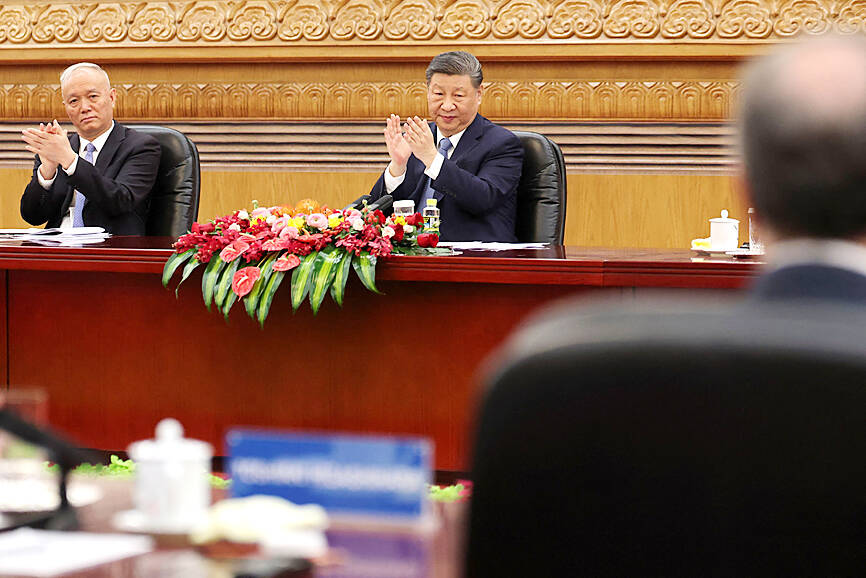Chinese President Xi Jinping (習近平) yesterday met with a group of global business leaders in Beijing in an effort to boost investor sentiment as rising tariffs fuel uncertainty about the economy and international trade.
Xi sat down with representatives of international industrial and business firms at the Great Hall of the People in Beijing yesterday morning, Xinhua news agency reported, without elaborating.
They included Rajesh Subramaniam of FedEx Corp, Bill Winters of Standard Chartered PLC, Paul Hudson of Sanofi SA, Pascal Soriot of AstraZeneca PLC and Miguel Angel Lopez Borrego of ThyssenKrupp AG.

Photo: Reuters
Officials in attendance included Chinese Minister of Foreign Affairs Wang Yi (王毅), Minister of Commerce Wang Wentao (王文濤) and Minister of Finance Lan Foan (藍佛安).
After the meeting, Xi said in front of reporters that seven business representatives shared their views that the Chinese government would “study and consider.”
“All of you are welcome to keep your lines of communication with us,” Xi said, praising the attendees for contributing to China’s growth and creating job opportunities.
“Foreign businesses are important participants in China’s modernization,” he added.
Slowing economic expansion and mounting geopolitical tensions have hurt the appeal of investing in the world’s second-biggest economy, with inbound investment tumbling last year to its lowest in more than three decades.
More headwinds might come next month, when the US is set to complete a review of Beijing’s compliance with the phase-one trade deal struck during US President Donald Trump’s first term and impose reciprocal duties globally.
Chinese Premier Li Qiang (李強) on Sunday said that the country is prepared for “shocks that exceed expectations,” as the government targets an ambitious growth target of about 5 percent this year.
Economists estimate that Beijing would need to unleash trillions of yuan in stimulus to hit that goal if tariffs surge.
China’s interaction with the top business figures underscores the message it has been sending that the nation is open for business — contrasting itself with Trump’s more protectionist “America first” policies.
Beijing is also trying to cast itself as a supporter of private enterprise, illustrated by Xi’s meeting last month with entrepreneurs such as Alibaba Group Holding Ltd (阿里巴巴) cofounder Jack Ma (馬雲).
Many global chief executive officers had traveled to China for the annual China Development Forum and the Boao Forum for Asia, which concluded yesterday.
The meeting marked an upgrade from earlier years when China’s No. 2 official met executives on the sidelines of the China Development Forum, although Xi broke precedent last year to meet with a group of US businesspeople.
US Senator Steve Daines, a member of the Senate Foreign Relations Committee, met with several Chinese leaders, including Li, earlier this week, in what has been seen as an initial step to set up a summit between Xi and Trump.
Several US firms have already been caught in the crossfire of deteriorating bilateral relations.
Chinese authorities summoned Walmart Inc executives this month over reports it asked suppliers to bear rising costs incurred by increased US tariffs.
Beijing earlier placed Calvin Klein owner PVH Corp and US gene sequencing company Illumina Inc onto a so-called blacklist of entities as US tariffs took effect.

Taiwan will prioritize the development of silicon photonics by taking advantage of its strength in the semiconductor industry to build another shield to protect the local economy, National Development Council (NDC) Minister Paul Liu (劉鏡清) said yesterday. Speaking at a meeting of the legislature’s Economics Committee, Liu said Taiwan already has the artificial intelligence (AI) industry as a shield, after the semiconductor industry, to safeguard the country, and is looking at new unique fields to build more economic shields. While Taiwan will further strengthen its existing shields, over the longer term, the country is determined to focus on such potential segments as

UNCERTAINTY: Innolux activated a stringent supply chain management mechanism, as it did during the COVID-19 pandemic, to ensure optimal inventory levels for customers Flat-panel display makers AUO Corp (友達) and Innolux Corp (群創) yesterday said that about 12 to 20 percent of their display business is at risk of potential US tariffs and that they would relocate production or shipment destinations to mitigate the levies’ effects. US tariffs would have a direct impact of US$200 million on AUO’s revenue, company chairman Paul Peng (彭雙浪) told reporters on the sidelines of the Touch Taiwan trade show in Taipei yesterday. That would make up about 12 percent of the company’s overall revenue. To cope with the tariff uncertainty, AUO plans to allocate its production to manufacturing facilities in

COLLABORATION: Given Taiwan’s key position in global supply chains, the US firm is discussing strategies with local partners and clients to deal with global uncertainties Advanced Micro Devices Inc (AMD) yesterday said it is meeting with local ecosystem partners, including Taiwan Semiconductor Manufacturing Co (TSMC, 台積電), to discuss strategies, including long-term manufacturing, to navigate uncertainties such as US tariffs, as Taiwan occupies an important position in global supply chains. AMD chief executive officer Lisa Su (蘇姿丰) told reporters that Taiwan is an important part of the chip designer’s ecosystem and she is discussing with partners and customers in Taiwan to forge strong collaborations on different areas during this critical period. AMD has just become the first artificial-intelligence (AI) server chip customer of TSMC to utilize its advanced

Chizuko Kimura has become the first female sushi chef in the world to win a Michelin star, fulfilling a promise she made to her dying husband to continue his legacy. The 54-year-old Japanese chef regained the Michelin star her late husband, Shunei Kimura, won three years ago for their Sushi Shunei restaurant in Paris. For Shunei Kimura, the star was a dream come true. However, the joy was short-lived. He died from cancer just three months later in June 2022. He was 65. The following year, the restaurant in the heart of Montmartre lost its star rating. Chizuko Kimura insisted that the new star is still down